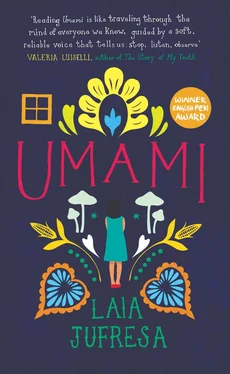Noelia, on the other hand, loved the whole family. She nicknamed the mother Lindis and forgave all the late rent on the basis that Lindis and her husband were artists and had many mouths to feed. When the mouths were very small, we used to do things together as a group: long discussions over drinks in the evening, barbeques. Linda used to toast my amaranth and sell it all over the block, and one time they organized a string-quartet concert on my milpa , a real sight to behold. But later on, the tenants started keeping themselves to themselves. Or maybe Noelia and I grew too old and frumpy for their liking so they stopped inviting us. It was around that time that I took to calling her the gringa. Only last year did she go back to being just Linda, one day when she turned up at Umami with a selection of scarves.
‘I’ve come to teach your wife how to make a turban,’ she said.
The hair loss from the chemo had floored Noelia. What did I tell you before, Nina? Noe was a real coquette, and she couldn’t bear anyone seeing her bald head, so she insisted on covering it with beanie hats, caps and god-awful wigs that made her scalp itch like crazy. And her silly self-torture drove me crazy in turn. Agatha Christie must have related some of this private drama to her mom, and at first I didn’t know how to react to Linda’s unsolicited call. I worried that Noelia would take offense. But, as I’ve proved on countless other occasions in my life, I don’t possess a scrap of the female intuition that men these days are supposed to have, and Linda’s crash course turned out to be a hit. The rags, as Linda called them, were a real relief to Noe, and for a time, if the two turbaned women happened to cross paths in the passageway, the mews looked like some kind of spiritual retreat.
Then, one day Linda turned up at the Mustard Mug and sat down at my table. From that day on we’ve held a tacit pact not to mention our meetings to anyone. She too had been signed off work. Apparently that’s the way that our cultural institutions deal with loss; perhaps it’s their way of debunking the stereotype that in Mexico we know how to live hand in hand with death.
Linda orders vodka in the Mug, out of discretion. I drink tequila, since I no longer have anybody to smell it on me. Every now and then the barman pulls out all the stops and serves me my tequila shot with a chaser of delicious spicy sangrita , which Linda then eats with her finger, dunking then sucking it. I’ve tried hard to find something erotic in this gesture, but my best efforts are hampered by an overriding feeling of tenderness toward her. She’s also a tall lady, and I like my women compact: Noelia was as short as a toadstool.
We never have more than a couple of drinks each. Me because I’ve always been a lousy drinker, and her because she has to go afterward to pick up the kids from school. Linda stays till one thirty at the latest, and the vodka always sets her off. She has deep-set green eyes, and when she cries they go puffy and pink. Some days we talk, and others we don’t even get beyond hello. Every now and then I well up too, in which case Linda will ask for some napkins and we’ll sit there blowing our noses. If we do talk it’s about old times: her gringo childhood, my Mexico City youth, our lives before our lives with our dead. Or we talk about operas we remember. Or food. I give her recipes for exotic sauces. She explains how to make fermented pickles.
*
Now that I think about it, marriage isn’t all that different from mid-morning TV. In the end, to be married is to see the same old movies — some more treasured than others — over and over again. The only things that ever change are the bits in between, the things tied to the present: news bulletins, commercials. And by this I don’t mean that it’s boring. On the contrary, it’s awful what I’ve lost: the cement that held the hours together, the comfort of Noelia’s familiar presence which filled everything, every room, whether she was at home or not, because I knew that unless she had a heart attack on her hands she’d be home to eat and have a siesta, then back again for dinner and to watch TV, finally falling asleep with her cold feet against my leg. The rest — all the world events, falling walls and stocks, personal and national disasters — was nothing. What you miss are the habits, the little actions you took for granted, only to realize that they were in fact the stuff of life. Except, in a way, they also turned out not to be, because the world goes on spinning without them. Much like amaranth when they banned it. What must the Aztecs have thought when the Spaniards burnt their sacred crop? ‘Sons of bitches,’ they must have thought. And also, ‘Impossible! Impossible to live without huautli .’ But they were wrong and so was I: Noelia died and life goes on. A miserable life if you like, but I still eat, and I still shit.
*
‘Those bugs,’ my wife would say.
I never got my head around how anyone could see something ugly in a butterfly, especially someone from Michoacán, the land of monarchs.
‘They flap around you!’ she argued.
Then she’d come out with far-fetched theories, tall tales from her childhood.
‘If moths hover close to your eyes their powder can blind you.’
‘What kind of scientist are you?’
‘A paranoid one. That’s very important, listen: you must always make sure your doctor’s a believer, or at least that he somehow fears the final judgment, because the rest of them are nothing but butchers.’
*
Here the top-ten nuptial movies reshown in this household over the last thirty years:
Tough Day at the Clinic — Pour Me a Tequila
A PhD Student Calls (I’m Not In)
Procreation (The Prequel)
Amaranth and Milpas
The Tenants
Belldrop Mews
For Whom the Beeper Tolls
Only a Daughter
Umami
The Girls
*
Noelia constructed an entire oral mysticology around the term ‘only a daughter’, which I’ll do my best to reproduce here, both from what I remember and with the help of Nina Simone. I’m a son too, only a son, and now an old son, but I never identified with all the things Noelia insisted were symptoms of our chosen condition as nobody’s parents.
Noelia named this state of being only a daughter ‘offspringhood’. I told her that the concept was flawed because it was the same as the state of being ‘human’ or even of ‘being’: we’re all someone’s offspring.
‘I don’t care,’ she said.
Then I suggested that, seeing as we have maternity, paternity and fraternity, it might make more sense to call it ‘offspringity’. But she wasn’t having any of it.
‘Mysticology’ isn’t a word either, of course, but after three decades, one person’s bad habits stick on the other, so now it’s my turn to make up words at whim. When all’s said and done, no one’s going to pass judgment on Nina Simone. I won’t let an editor near her, nor would I dream of sending her into the rat hole that is the peer-review system.
I was saying: while I myself didn’t identify with the characteristic features of ‘offspringhood’, Noelia diagnosed me with all of them. I strongly denied the accusations held against me, at least in my inner courthouse. Because the same defects she branded me with (and which I acknowledged, sometimes), I also noticed in my friends with children. Especially as we grew older. We could all be impatient, irritable, intolerant, inflexible, spoiled, ailing, and pig-headed. Very pig-headed in fact: Páez had three kids and became more and more pig-headed with every one. Noelia said that it was because I didn’t have kids that I was the way I was sometimes:
Читать дальше












